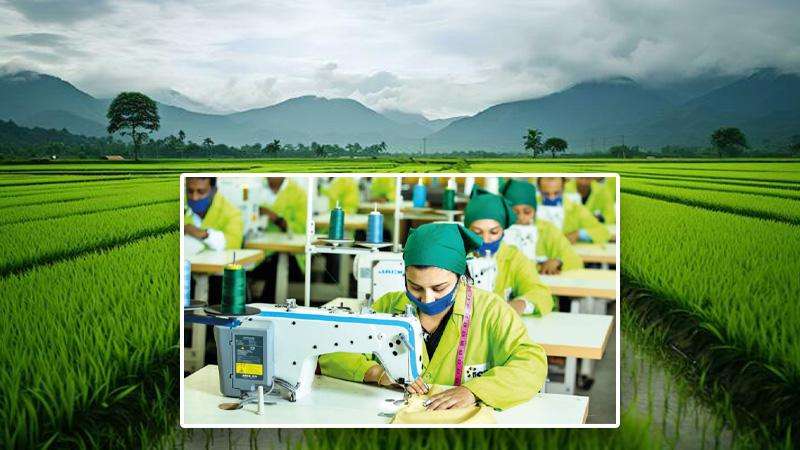The economy of Bangladesh that the previous dictator Prime Minister, Sheikh Hasina, put in a shambles will be lifted with policymakers, economists and business leaders seeing major challenges like curbing price of commodities, generating new employment and ensuring sound law and order situation and energy security.
Foreign employment in overseas markets during the January-September period nosedived with price of commodities still high, implementation of annual development programme (ADP) perhaps the lowest in recent years and still shaking law and order situation, said a top leader of the Federation of Bangladesh Chamber of Commerce and Industry (FBCCI).
Asian Development Bank (ADB) has cut its forecast for Bangladesh's economic growth to 5.1 percent for the current fiscal year, primarily due to supply disruptions caused by political unrest in July and August 2024.
The Manila-based multilateral lender had earlier projected that the overall production of goods and services in Bangladesh would grow by 6.6 percent for the fiscal year (FY) 2024-25.
The ADB said it lowered Bangladesh's GDP growth projection for the current fiscal, also taking into account the recent floods.
"Additionally, fiscal and monetary policies are expected to remain tight, further dampening consumption and investment demand. The forecast is highly uncertain as significant downside risks cloud the macroeconomic outlook," the ADB said.
"These risks primarily stem from ongoing political instability, a fragile law-and-order situation, and vulnerabilities within the financial sector."
Bangladesh economy grew 7.1 per cent in 2016, 7.32 per cent in 2018, 7.88 per cent in 2019 and 7.1 per cent in 2022. A top leader of the Federation of Bangladesh Chambers of Commerce and Industry (FBCCI) said that Bangladesh economy needs to grow 7.00-8.00 per cent in the next 5-10 years to become a economic tiger in the region. He said India economy has been growing around 8.00 per cent in the consecutive years. Sri Lanka which economy that has been teetering in recent years has back on the right track overcoming the crisis.
According to the Bureau of Manpower, Employment and Training (BMET) sources, the manpower export of Bangladesh will see a major negative growth this year compared to the previous year………
The jobs of some 100,000 Bangladeshis working in Lebanon have become uncertain amid the recent Israeli attack on the Mediterranean country.
Bangladesh Ambassador to Lebanon Air Vice Marshal Javed Tanveer Khan, OSP, BSP, ndc, afwc, acsc, psc while talking to the Dazzling Dawn said that the government is planning to bring expatriate Bangladeshis back from Lebanon amidst ongoing Israeli attacks.
The repatriation efforts are hampered by a lack of commercial flights, with only Middle East Airlines operating from Beirut, reports bdnews24.com.
Anwar Hossain, the first secretary (labour) at the Bangladesh Embassy in Beirut, said that the embassy is coordinating with the foreign ministry to facilitate the return of Bangladeshis wishing to come home.
“We have informed the foreign ministry of the overall situation and continue to do so daily. However, the specific details of how they will be repatriated are still under consideration by the ministry.”
According to the BMET, overseas employment of Bangladeshi workers saw a 40% year-on-year decline in September this year, although it rose by 28% compared to the previous month, with 64,697 workers sent abroad – 44,269 of whom went to Saudi Arabia.
The trend in foreign employment has been decreasing recently due to political instability and the closure of the Malaysian market, but recruiters report signs of recovery as conditions stabilise.
Before the pandemic, Bangladesh typically sent between 60,000 and 70,000 workers abroad each month. After the pandemic, this number surged to over 100,000 per month due to rising demand and the reopening of the Malaysian market.
The present interim government of Nobel laureate Professor Yunus has also some issues that the country is watching closely like curbing corruption, reforming the banking sector, ensuring good governance, attracting new investment and protecting minorities, said economists, business leaders and policy makers.
Sheikh Hasina, the long-serving Prime Minister of Bangladesh, stepped down on August 5, 2024 and left the country amid massive student protest, leaving the economy of Bangladesh into a total mess.
The present interim government of Nobel laureate Professor Yunus has also got a shattered economy and the people of this country need patience to overcome economic mess that Sheikh Hasina, the last brutal dictator of Bangladesh, left while fleeing to neighboring India
Dr Ijaz Hossain, Professor of Department of Chemical Engineering of Bangladesh University of Engineering and Technology (BUET), while talking to The Dazzling Dawn said that Bangladesh usually experiences load-shedding during March –April and September.
He said load-shedding to the tune of 1000 megawatts is tolerable, but the load-shedding to the tune of 2000-2500 megawatts is intolerable. But the load-shedding crosses 2000-2500 megawatts in some days, crippling the life miserable during the scorching hot weather. The climate change with scorching hot weather and high humidity make life unmiserable.
Dr Ijaz Hossain said the interim government has been in a catch 22 situation and the interim government was not prepared to experience this situation.
Foreign currency reserve in Bangladesh dropped alarmingly after the Russia-Ukraine war began in February 2022 and the reserve dropped to some 20-22 billion US dollars. The reserved climbed to 48 billion US dollars in 2021 banking on robust export earnings. As the reserve is low, Bangladesh is struggling to import necessary coal, LNG and oil –the main ingredients to produce power.
Meanwhile, business leaders at a roundtable in the city on Saturday called upon the interim government for restoring fully the law and order especially in the industrial belts, lowering interest rates and carrying out necessary reforms for ensuring smooth operations and sustainability of the industries.
They made the call at a roundtable on “Current State of the Economy and Outlook of Bangladesh” organized by the Dhaka Chamber of Commerce and Industry (DCCI) at the DCCI auditorium.
Speaking at the roundtable, Mir Nasir Hossain, former president of FBCCI, said that the recent labour unrest has shattered the country’s image in the global market.
He said that not only the export-oriented industries but also the domestic market-based industries are important.
Nasir said, the real effective rate of interest is too high in Bangladesh and it often hampers the entrepreneurs to compete with the international market.
Saying that reforms are badly needed in the NBR and customs houses, Nasir said, “Moreover, customs houses should be automated. Although the initiative has been taken few years back, but it is yet to see the light”.
He said although an affluent middle income group has grown up in recent past in the country, but in line with that, the tax net has not been widened, which is not desirable.
The former FBCCI chief said due to lack of uninterrupted gas supply, the manufacturing industries are suffering a lot. To resolve the crisis, he suggested for strengthening on-shore and off-shore gas exploration.
Syed Nasim Manzur, President of Leather Goods and Footwear Manufacturers & Exporters Association said that the businessmen now feel unsecured due to labour unrest and vandalism.
Declining the purchase capacity of people triggered by high inflation of money led to reduce public consumption of food and services remarkably, he noted.
Nasim said that the double-digit rate of interest on industrial loan is not viable for sustaining in the competitive market.
He said, FDI is needed for a country like Bangladesh, but due to low confidence, it remains stagnant now. He hoped that FDI will see a positive move within few days.
Calling for protection of RMG sector, Nasim Monzur said, “We’ve to save the RMG industry as it has a multiplier impact on our overall economic value chain”.
Mohammad Hatem, President of Bangladesh Knitwear Manufacturers and Exporters Association (BKMEA), said that a good understanding and relation between the owners, workers and labour leaders can mitigate any unrest as well as violence in the factories.
He also laid importance on giving industry owners adequate time to repay their loans requesting the Bangladesh Bank to take steps in this regard.
Dr. M. Masrur Reaz, Chairman & CEO, Policy Exchange Bangladesh said, the government could not take the right policy in right time which caused the macro-economic crisis in recent past.
“Confidence level of investors is shattered now, law and order especially disorder in the ‘order’ part, labour unrest, inflation are some of the pressing issues for the macroeconomic challenges for Bangladesh,” he said.
Reaz also said, “We’ve seen a commendable progress in the banking sector reforms recently, but in the other areas we’re yet to see the policy governance.”
“We’ve to keep our forex reserve stable through steady flow of remittance, export earning and FDI to restore confidence of the people,” he said.
Shams Mahmud, former President of DCCI & Managing Director of Shasha Denims Limited mentioned that the labor unrest in Ashulia region disrupts the production in the factories.
“If the law and order situation does not come into normalcy there, buyers’ confidence will be hampered and thus buyers’ order may shift from Bangladesh to other competitors,” he said.
Regarding NPL, he said for the mismanagement of banks, genuine businesses should not suffer in getting loans while the banks should also be accountable for any mismanagement.
Ahsan Khan Chowdhury, Chairman & Chief Executive Officer (CEO) of PRAN-RFL Group noted that Bangladesh is a land of opportunities and it could be one of the hub of global business for its immense potentials.
He said, the main task of the business community is to create employment, but sometimes, it causes setback due to labour unrest.
Laying importance on active role of police in marinating law and order, he said, “We want to see the police as it should be,…We want to see all law enforcing agencies back again with their full capacity.”
Ahsan also said that with the high rate of bank interest, it is difficult to sustain. “We should have a rewarding system for the good borrowers. There should not be any restriction on opening LCs to create employments and keep operational the wheels of industries.”
Syed Mohammad Kamal, Country Manager of Mastercard Bangladesh said, from July-August, digital spending has remarkably dropped down as consumption was in the downward trend.
He suggested incentivizing digital payment system over cash payment. At present the remitters get 2.5 percent incentive on their remittances sent to Bangladesh. If this facility is withdrawn, they will go for unofficial channel to send remittance to home that may affect foreign currency reserves, he observed.
Ambareen Reza, Co-Founder, Chairman & CEO of Foodpanda Bangladesh urged for low cost fund for the SMEs. She also said that number of loan defaulters in the CMSMEs or startups is very negligible.
DCCI President Ashraf Ahmed said, at present Bangladesh is experiencing an unstable economic growth trajectory with slow GDP growth, coupled with few other challenges.
Currency devaluation, rising inflation, financial instability, labour unrest, concerns over energy security and disruptions in key export industries are making the country’s economy unstable.
He suggested for immediate restoration of law-and-order situation as it required for the stability in the current business environment.
Ashraf also stressed on faster reforms in the banking governance and suggested to address NPL and liquidity shortage issues that must be prioritized to restore confidence in the financial system.
To combat inflation, he said, the government can pursue supply-side reforms to ensure smooth distribution of essential goods and services.
Diversification of the energy mix and new energy supply routes and improving investment in the energy sector are must for safeguarding the industrial productivity, he added.
The DCCI president suggested for planned housing, education and healthcare services in the Ashulia and adjacent areas to provide a low cost living facilities to the workers of that particular area.
DCCI Senior Vice President Malik Talha Ismail Bari was also present on the occasion.
Meanwhile, the July-August period – the first two months of the current fiscal year – witnessed the lowest-ever implementation of the Annual Development Programme (ADP), falling below 3%.
According to data from the Implementation Monitoring and Evaluation Department (IMED) released today (2 October), Tk7,143 crore of the ADP was spent during the period, reflecting an implementation rate of 2.57%.
Data available on the IMED website, dating back to FY11, shows that no fiscal year has recorded an ADP implementation rate below 3%. In FY24, the rate was 3.84%, slightly lower than the previous fiscal year.
The Business Standard Google News Keep updated, follow The Business Standard's Google news channel
For FY25, the ADP allocation stood at Tk278,288 crore.
IMED officials explained that project staff are typically occupied with preparatory work at the beginning of the fiscal year, which contributed to the low implementation rate.
Additionally, development activities were hindered by the mass uprising in July-August, the subsequent change of government, and the resulting political instability during the period.
In several foreign-funded projects, foreign workers, contractor representatives, and consultants left the project sites, which further hindered project implementation.
Additionally, the government has decided to review both proposed projects in the pipeline and ongoing ones.
The proposals to extend the duration and increase the costs of many ongoing projects have also been delayed. As a result, ADP implementation has been prolonged, officials noted.
According to the IMED report, public fund expenditures during the July-August period amounted to Tk3,241 crore, which is 1.69% of the public fund allocation. This marks the lowest amount ever spent during July-August in any fiscal year.
By comparison, Tk6,854 crore was spent during the same period last year, representing 1.27% of the public fund allocation for that fiscal year. Meanwhile, Tk3,098 crore, or 3.10%, of the foreign aid allocation has been spent in July-August of the current fiscal year, compared to 3.58% spent from foreign funds during the same period last year.
Meanwhile, a total of labour associations today (6 October) demanded the government implement the 18-point tripartite agreement between the owners, the workers and the government, and sought justice for the garment worker killed during recent protests.
In a joint press conference, the leaders urged all parties to avoid repressive measures against workers and act responsibly.
They also called on workers to refrain from spreading rumours or misinformation that could destabilise the situation.
Additionally, the labour leaders urged workers to be cautious of any attempts to disrupt production.
Montu Ghosh, president of the Bangladesh Garment Workers Trade Union Centre, read a written statement at the press conference.
According to the statement, some garment factory owners have continued repressive practices since the political change on 5 August.
"Due to a long history of being denied legal rights, free trade unions, and basic facilities, workers felt compelled to protest and demand change at various factories. This led to the signing of the 18-point agreement on 24 September during a tripartite meeting at the Ministry of Labour and Employment," reads the statement.
Mentioning that one worker was killed and over a hundred were injured during the recent unrest, the labour leaders demanded the arrest and severe punishment of those involved.
Meanwhile, the recent floods in eastern Bangladesh caused damage estimated at Tk 14,421.46 crore, which is around $1.20 billion, according to a study by the Centre for Policy Dialogue (CPD).
The findings were presented at a media briefing titled "Recent Flood Damage and Rehabilitation Process in Eastern Region: CPD's Analysis" at the CPD office in Dhaka
The study highlighted that the damage represents 1.81 percent of the national budget for fiscal year (FY) 2024-25.
In terms of GDP, it accounts for 0.29 percent of FY24's provisional GDP and 0.26 percent of the projected GDP for FY25.
The floods, which began on August 19, 2024, were caused by continuous heavy rainfall and upstream water flows, affecting 11 districts in the region.
CPD's damage assessment focused on Sylhet, Moulvibazar, Habiganj, Feni, Khagrachhari, Cox's Bazar, Cumilla, Noakhali, Chattogram, Lakshmipur, and Brahmanbaria.
The agriculture and forestry sectors were the most severely impacted, suffering Tk 5,169.71 crore in damages, or 35.85 percent of the total.
The infrastructure sector followed with losses of Tk 4,653.92 crore (32.27 percent), while the housing sector incurred damages of Tk 2,407.31 crore (16.69 percent), according to the CPD study.
Noakhali experienced the highest monetary losses, accounting for 29.07 percent of the total damage, followed by Cumilla (23.51 percent), Feni (18.61 percent), and Chattogram (11.63 percent).
The data also points out that districts such as Noakhali, Cumilla, and Feni were disproportionately affected.

_4.jpg)
_6.jpg)
_1.jpg)




.svg)




